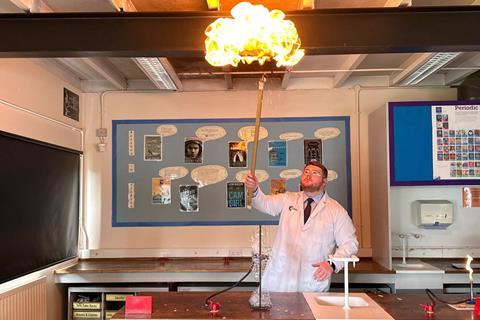Sports-mad Harry shares his favourite resources and his most embarrassing school moments
-

Harry Lord loves football, cycling and periodic table ties. And he very nearly wasn’t a teacher. Harry originally studied medicinal chemistry at university. Thankfully for the many learners he’s since taught, he then applied to the University of Manchester and the RSC’s teacher training scholarship scheme to train to teach chemistry. Since qualifying he’s been teaching at Haslingden High School and Sixth Form in the north-west of England, where he is currently head of year. He’s also a qualified football coach and even finds time to write articles and teaching resources. We asked him about teaching, his inspiration and his miming skills.
What do you wear to school? Do you have a favourite outfit for teaching?
Shirt, trousers … and a periodic table or Burnley Football Club-related tie!
What’s your favourite teaching hack?
Developing a good understanding of cognitive science and how students learn. This really helps you plan effective explanations for difficult concepts.

Do you have a teaching resource you keep coming back to?
I’d heartily recommend microscale and integrated instructions for practicals. In my experience they work so well together because they allow students to better understand what’s going on in an experiment. This helps ensure they have the cognitive load available to apply the practical to the theory.
I’d heartily recommend microscale (rsc.li/4cIiXjA) and integrated instructions for practicals (rsc.li/4bwZdyh). In my experience they work so well together because they allow students to better understand what’s going on in an experiment. This helps ensure they have the cognitive load available to apply the practical to the theory.
Microscale practicals also help reduce the environmental impact of our experiments as well as improving safety and reducing risk.
Describe an embarrassing moment you’d rather not relive in your classroom or teaching life …
If I’m honest, there have been hundreds of embarrassing moments! It is one of the joys of working with young people. Two highlights involved me dressing up – first in an inflatable snowman costume to dance around while the school band played Christmas songs, and second as the wrong Gallagher brother when I mimed an Oasis song for the staff show at Christmas.
Are you involved in any extracurricular activities at school?
I loved helping out with the football team, winning the Rossendale Cup was a proud moment.
I was also involved with a research project between our sixth-form students, Bolton School Boys’ Division and the University of Manchester. They researched how contact lenses break down in different environments, then presented this to The Royal Society in London. This project was developed as a result of collaborating with my former RSC scholarship mentor Kristy Turner.
Seeing our Haslingden High students answering questions and presenting findings to some of the most prestigious scientists alongside students from top UK schools was amazing.
What’s your favourite current read?
I have to admit I’m terrible at sitting down and reading, but I do listen to lots of podcasts including all things football, cycling and education.
If I had to choose one favourite it would be Football Cliches with Adam Hurrey. Me and a few mates got to see the live version in Manchester earlier this year; the podcast team had everyone in stitches.
Imagine you can only share one piece of advice with your fellow teachers, what would you say?
Find the right school where you are valued and supported to ensure our young people get what they deserve.
How do you relax?
Watching cycling on TV and getting out on my bike, as well as watching Burnley lose!

Who’s your hero?
Normally I would say Everton manager Sean Dyche, but watching and learning about rugby legend Rob Burrow and how he lived his life is truly inspirational.
Suggest a question or two for the next teacher in this series
Why did you get into teaching in the first place? When did you last fully reflect?
Get involved
Want to suggest a question? Want to be the next teacher, technician or trainer in this series? Email education@rsc.org today.











1 Reader's comment